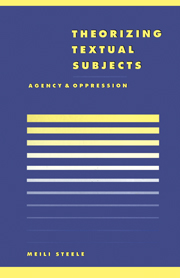Book contents
- Frontmatter
- Contents
- Acknowledgments
- Introduction
- 1 Stories of oppression and appeals to freedom
- 2 Language, ethics, and subjectivity in the liberal/communitarian debate
- 3 Theorizing narratives of agency and subjection
- 4 Truth, beauty, and goodness in James's The Ambassadors
- 5 The subject of democracy in the work of Ralph Ellison
- Conclusion
- Bibliography
- Index
3 - Theorizing narratives of agency and subjection
Published online by Cambridge University Press: 06 July 2010
- Frontmatter
- Contents
- Acknowledgments
- Introduction
- 1 Stories of oppression and appeals to freedom
- 2 Language, ethics, and subjectivity in the liberal/communitarian debate
- 3 Theorizing narratives of agency and subjection
- 4 Truth, beauty, and goodness in James's The Ambassadors
- 5 The subject of democracy in the work of Ralph Ellison
- Conclusion
- Bibliography
- Index
Summary
“We need a moral philosophy that can speak significantly about Freud and Marx, and out of which aesthetic and political views can be generated.”
Iris Murdoch“I loved history as a child, until some clear-eyed young Negro pointed out, quite rightly, that there was no place in the American past I could go and be free. I now know that slavery neither eliminated heroism nor love; it provided occasions for their expression.”
Sherley Anne WilliamsIn her introduction to Revaluing French Feminism, Nancy Fraser brings into focus the central dilemma that emerges from the first two chapters: “Either we limn the structural constraints of gender so well that we deny women any agency or we portray women's agency so glowingly that the power of subordination evaporates” (p. 17). None of the theories traced in the first two chapters has offered a satisfactory account of the interplay between the two kinds of stories we need for critical theory: those that speak of the subject's determination and those that speak of the subject's ethical/political agency. Jameson and the poststructuralists tell different, but one-sided, stories of subjection. Habermas offers a narrative of agency to balance the one of determination, but his theory provides no way to characterize the richness of these narratives. Rorty's view offers agency without ethical depth or an account of oppression. MacIntyre gives new resources to narratives of agency, but he leaves them in a political vacuum.
- Type
- Chapter
- Information
- Theorising Textual SubjectsAgency and Oppression, pp. 108 - 149Publisher: Cambridge University PressPrint publication year: 1997



